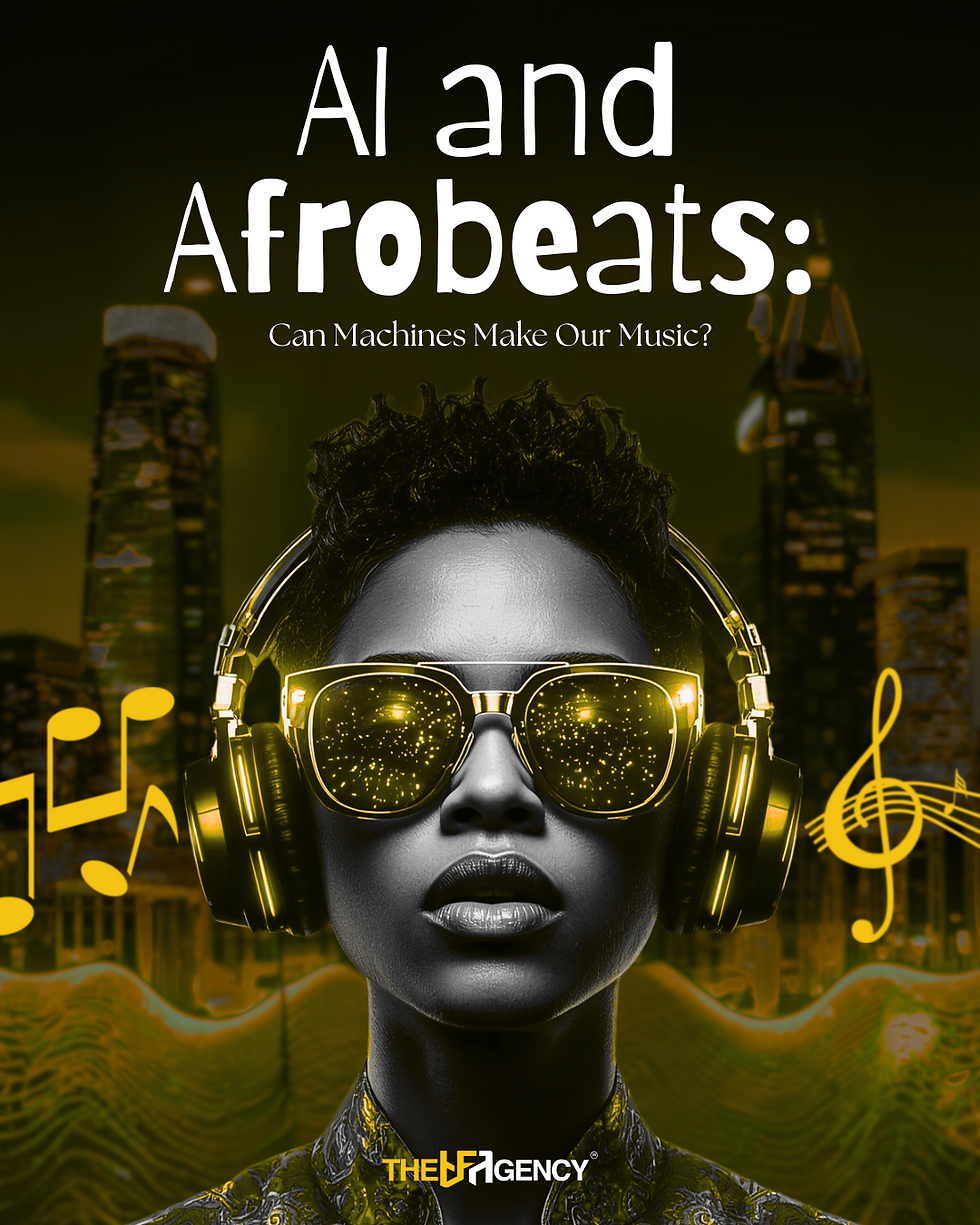AI and Afrobeats: Can Machines Make Our Music?
- BFA Agency

- Jul 18, 2025
- 3 min read

Summary
Artificial intelligence is rapidly changing music production, and Afrobeats, one of the world’s most dynamic genres is a prime test case. In this article we explore how AI tools are being used in Afrobeats, the risks they pose to cultural authenticity, the ethical and legal questions they raise and the ways they could empower African artists rather than replace them.
Introduction: The Rhythmic Convergence of AI and Afrobeats
Afrobeats emerged in Nigeria in the late 1990s by blending pop, hip‑hop, dancehall, and traditional percussion into vibrant, danceable tracks. It is often confused with Afrobeat, Fela Kuti’s politically charged jazz‑funk fusion from the 1960s and 70s. Afrobeats is broader and more eclectic, mixing genres like jùjú, house, R&B, and ndombolo into shorter, catchy songs that celebrate love, joy, identity, and sometimes social issues. With its rich rhythms, layered instrumentation, and lyrics in English and regional languages, Afrobeats has become a global movement that redefines African identity.
Overview of AI in Music Generation
AI now lets anyone generate music from simple text prompts. Describe a “mellow Afrobeats groove for a sunset drive” and AI platforms such as Jukebox, Suno, and Udio will produce melodies, rhythms, and even simulated vocals. These systems rely on deep learning models, transformers, GANs, diffusion networks trained on thousands of songs. They open creative possibilities by cutting costs and saving time, but they also prompt the question: can an algorithm truly understand the cultural depth and emotion behind Afrobeats? It’s not all theory, AI is already making waves in real-world Afrobeats projects. Nigerian producer Eclipse Nkasi created an entire nine-track Afrobeats album, “Infinite Echoes,” using a mix of AI tools. He used ChatGPT for the lyrics and other apps for vocals and instrumentals. The album, featuring a virtual singer called Mya Blue, was completed in just three days and cost under $500, a process that would have taken months and a much larger budget without AI.

The Central Question: Can AI Truly Make “Our” Music?
AI can follow patterns, blend genres, and churn out technically competent tracks. But Afrobeats is built on lived experiences street stories, celebratory gatherings, community pride, and musical traditions passed down through generations. Most AI tools today are trained on Western music, which makes it hard for them to capture what makes Afrobeats special. If AI merely reproduces surface features without understanding context, it risks flattening the sound and diluting its soul.
The Authenticity Gap: Where AI Still Falls Short
A fundamental challenge is data bias. Over 85 percent of AI training data comes from the Global North, while under 6 percent covers non‑Western genres. This imbalance leads to watered‑down imitations of African styles. AI can mimic a talking drum pattern but not the emotions it carries. Without cultural context, AI‑generated Afrobeats can feel generic and miss the unpredictable, soulful spark that moves people. There is also a risk of homogenization, where mass‑produced AI tracks start to crowd out authentic, human‑made music.
Ownership, Ethics, and the AI Question in Music
AI’s rise raises thorny issues of copyright and cultural appropriation. If an AI model trained on thousands of Afrobeats tracks produces something that sounds like Davido or Ayra Starr, who owns that music? Artists already face piracy and low streaming royalties. AI risks flooding the market with copycat songs, undercutting creators. Additionally, when tech companies outside Africa build tools on African music without collaboration or credit, it becomes exploitation. Transparent data sources, fair licensing, and policies that involve African stakeholders are essential to protect artists and communities.

The Opportunity Ahead: Afrobeats, AI, and the Next Wave
Despite these challenges, AI holds promise as an empowering tool. It can help emerging producers in Lagos, Accra, or Abidjan create high‑quality music without expensive studios. It can archive and remix traditional sounds, keeping cultural heritage alive. AI‑driven insights into global listening trends can guide strategic releases and tours. The most exciting innovations will come from collaborations between African creatives and AI developers, tools trained specifically on African drumming patterns or vocal styles. For this to succeed, African artists must be co‑designers and owners of the technology.
Conclusion: Owning the Sound of the Future
Afrobeats rose by embracing innovation and cultural pride. The next chapter must be written by African artists, producers, and cultural workers who shape how AI serves them. AI can already make music. The real test is whether it can amplify human creativity, protect cultural identities, and keep the beat grounded in lived experience. If tech and tradition meet on equal ground, the global future of Afrobeats will remain vibrant, authentic, and unmistakably ours.



